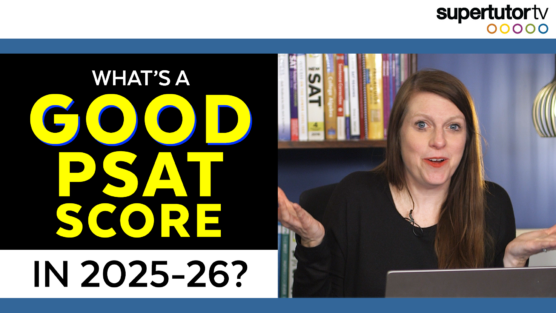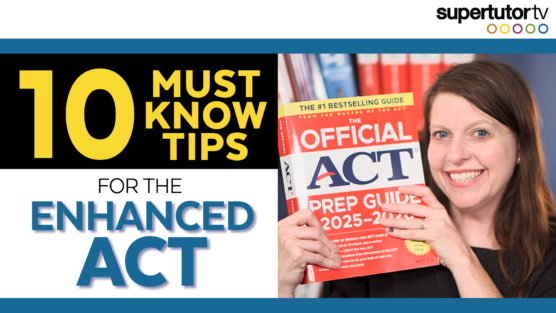If you’re applying to college in 2025 or beyond, there are four changes that the Common App has recently made that you should know about and know how to get the most out of. Also, we have an online course for the SAT, which I encourage you to check out. You can take a free SAT prep test on our site, supertutortv.com.
A New Essay
My first change that we see on the new Common Application is a new essay. Well, it’s not entirely a new essay. It’s a revision of what used to be the COVID essay. When COVID-19 hit, the Common Application introduced an essay for students to share how COVID has affected them. And if there are extenuating circumstances or other things that they think colleges should know that help explain their academic progress, their activities, etc. As COVID-19 has gotten further and further away, it’s no longer relevant for a lot of students because COVID happened in middle school, not in high school, and most of the time on your college application, you’re talking about what’s happened for the last four years. So, this essay has now been replaced by a 250-word essay called Challenges and Circumstances.
What I love about this is it gives students the perfect opportunity to explain if they have any extenuating circumstances in their lives that they need to share with colleges. If you have to drive an hour and a half to school every day, have a parent who is terminally ill, have any really challenging situations, or have no quiet study time, you need to explain that in your college application so colleges understand the obstacles you had to overcome to get the grades or SAT score that you got. And that context is what the Common App is asking for here, which is awesome. Now, you don’t need an essay coach like me to tell you that you should probably put this in even though you didn’t realize that’s what additional information would be good for. They’re kind of laying it out for you in a clearer way. So I think it’s great. It’s going to help students who do have these kinds of challenges share those challenges.
Shorter Additional Information Section
The second big change to the Common App is also essay-related, and it has to do with the Additional Information section. Previously, you had 650 whopping words in the Additional Information section. I had students leveraging it left and right to shove in whatever they couldn’t fit into their application otherwise. The bad news is, for my overachievers who were using this as sort of an overflow area for their activity section, in addition to waxing on poetically about seven other things they couldn’t fit in their essays, you’re no longer going to be able to do that.
Now you only have 300 words, which is not a lot. I still encourage students who run out of space in the activity section to use this section to delineate what activities they couldn’t fit there or to make clarifications if there’s just no space in the other section, but you’re going to have a little bit less space to work with.
Student Context Inventory
Next up is the student context inventory. This is an addition to the activity section, which I’m really excited about. One of the secrets that I often told some of my consulting students is that if they have responsibilities at home—taking their grandma to appointments three times a week or babysitting their brother or sister after school who’s 12 years younger than they are—these are things that colleges need to know so they understand where your time is going. Obviously, you can’t be in 54 activities if you have these family responsibilities. And now the Common App has checkboxes to encourage students to relay this information to colleges, which again, I think is awesome because obviously I’m telling my students these things when I get to know them and understand their backgrounds, but most of the people who need these checkboxes most aren’t my private students. Some of them might be out there, some of them might be my YouTube subscribers, but they’re not my private students who I’m coaching every step of the way through. So I think this is awesome.
Whether you’re taking care of siblings or working a paid job to contribute to your household income, this encourages students to open up and to share these things. I had a girl who was buying dinner for her family from her income because her parents didn’t have income. I mean, that’s wild and crazy, and she talked about it in an essay because I told her she needed to talk about that. And you can also expound upon these in that challenges and circumstances essay as well.
ACT Score Reporting
Finally, the last change is ACT score reporting. So as most of you know, the ACT has moved to an enhanced version of the ACT with an optional science section. Because of that change, there are differences now in how you report your ACT scores. I know some of you might be scratching your heads and wondering if you should retake the ACT again. This allows you to self-report both your highest super score as well as your individual section scores that are highest. You can also omit the science if you are in a particular circumstance where you’re not submitting the science scores because you don’t have science scores. I encourage all of you to make sure to consult individual schools you’re applying to in terms of their policies for submitting or withholding scores, or if they need a science score. But yeah, new reporting for ACT, which we show in the video above, so you can see what the layout looks like if you’re curious as to how you’re going to be reporting the ACT scores. I know it’s all a little bit confusing with the enhanced ACT because some of you are going to have non-enhanced ACT scores as you’re combining with the enhanced ACT for a super score.
So, there you go! If you are looking for more support with your college application, make sure that you subscribe to our channel and reach out to us at supertutortv.com, where you can also find out more about our resources. Thanks for joining us, guys, and good luck with your college admissions!




